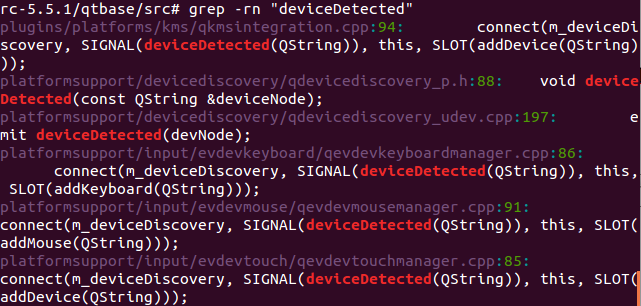上一篇文章已经介绍了qt键鼠热插拔经历的曲折之路,这篇就具体解决热插拔问题。
=======================================================
如上一篇文章所述,在源码中搜索了键鼠热插拔时的调试信息, qt.qpa.input: Found mouse at "/dev/input/event0"
qt.qpa.input: Found matching devices ("/dev/input/event0")
qt.qpa.input: Adding mouse at "/dev/input/event0"
qt.qpa.input: create mouse handler for "/dev/input/event0" ""
qt.qpa.input: evdevtouch: Using device discovery
在QT_ROOT/qtbase/src源码目录下搜索上述信息,在中断键入【grep -rn "Adding mouse at"】,结果如下

发现在QT_ROOT/qtbase/src/platformsupport/input/evdevmouse/qevdevmousemanager.cpp文件中存在相应语句。从命名上就可以猜到该文件是用来管理mouse的,后续验证确实是。将相应的函数贴出来:
在同一个文件中的类函数中(贴出部分,如下)可以看出该函数是用于接收信号的槽,且信号为deviceDetected
同理还存在另外一对信号与槽,全部列举出来: SIGNAL(deviceDetected(QString)) —— SLOT(addMouse(QString))
SIGNAL(deviceRemoved(QString))—— SLOT(removeMouse(QString)) 这两对函数正如猜测的那样,是udev管理热插拔时发出的,具体的发出位置可以搜索【grep -rn "deviceDetected"】 ,结果如下:

发现在名为qdevicediscovery_udev.cpp的文件中进行的信号发送工作:emit deviceDetected(devNode);
打开qdevicediscovery_udev.cpp所在路径的devicediscovery.pri文件,内容如下:
思路与目标已经明确:
1.在qdevicediscovery_static.cpp文件中实现检测键鼠插入与移除,并发送相应的信号deviceDetected/deviceRemoved即可。
2.检测键鼠的插入与移除可以检测文件系统中/dev/input/目录下设备节点的变化,具体的监听采用QFileSystemWatcher类的路径监听(directoryChanged)。
一、添加监听代码
1.为了方便恢复,复制qdevicediscovery_static.cpp和头文件为qdevicediscovery_hotplug.cpp和qdevicediscovery_hotplug_p.h,修改文件中的static关键字为hotplug(强迫症,可不修改)。
2.由于需要保持监听长时存在,因此监听的实例声明要放在头文件中,并添加相应头文件,由于需要记住上一次添加的设备,因此仿造.cpp文件实现添加一个QStringList变量。
添加头文件:#include
声明信号函数:
3.初始化监听变量与信号监听函数实现
信号监听函数实现
4.修改QStringList QDeviceDiscoveryHotPlug::scanConnectedDevices()函数,保存添加设备的列表 将QStringList devices;改成m_devices.clear();,用以清除上一次的值 将该函数中的devices全部改成m_devices,用以保存新的值。
二、修改devicediscovery.pri文件中的编译选项 如下:
修改文件完成后,重新make/make install,将安装后的qt文件移植到开发板上即可。现在QT5.5.1已经支持热插拔了~~~~
附录:修改后的qdevicediscovery_hotplug.cpp和qdevicediscovery_hotplug_p.h文件如下 1.qdevicediscovery_hotplug.cpp文件具体代码如下:
2.qdevicediscovery_hotplug_p.h文件具体代码如下:
=======================================================
如上一篇文章所述,在源码中搜索了键鼠热插拔时的调试信息, qt.qpa.input: Found mouse at "/dev/input/event0"
qt.qpa.input: Found matching devices ("/dev/input/event0")
qt.qpa.input: Adding mouse at "/dev/input/event0"
qt.qpa.input: create mouse handler for "/dev/input/event0" ""
qt.qpa.input: evdevtouch: Using device discovery
在QT_ROOT/qtbase/src源码目录下搜索上述信息,在中断键入【grep -rn "Adding mouse at"】,结果如下

发现在QT_ROOT/qtbase/src/platformsupport/input/evdevmouse/qevdevmousemanager.cpp文件中存在相应语句。从命名上就可以猜到该文件是用来管理mouse的,后续验证确实是。将相应的函数贴出来:
void QEvdevMouseManager::addMouse(const QString &deviceNode)
{
qCDebug(qLcEvdevMouse) << "Adding mouse at" << deviceNode;
QEvdevMouseHandler *handler;
handler = QEvdevMouseHandler::create(deviceNode, m_spec);
if (handler) {
connect(handler, SIGNAL(handleMouseEvent(int,int,bool,Qt::MouseButtons)), this, SLOT(handleMouseEvent(int,int,bool,Qt::MouseButtons)));
connect(handler, SIGNAL(handleWheelEvent(int,Qt::Orientation)), this, SLOT(handleWheelEvent(int,Qt::Orientation)));
m_mice.insert(deviceNode, handler);
QInputDeviceManagerPrivate::get(QGuiApplicationPrivate::inputDeviceManager())->setDeviceCount(
QInputDeviceManager::DeviceTypePointer, m_mice.count());
} else {
qWarning("evdevmouse: Failed to open mouse device %s", qPrintable(deviceNode));
}
}在同一个文件中的类函数中(贴出部分,如下)可以看出该函数是用于接收信号的槽,且信号为deviceDetected
。。。。
qCDebug(qLcEvdevMouse) << "evdevmouse: Using device discovery";
m_deviceDiscovery = QDeviceDiscovery::create(QDeviceDiscovery::Device_Mouse | QDeviceDiscovery::Device_Touchpad, this);
if (m_deviceDiscovery) {
// scan and add already connected keyboards
QStringList devices = m_deviceDiscovery->scanConnectedDevices();
foreach (const QString &device, devices) {
addMouse(device);
}
connect(m_deviceDiscovery, SIGNAL(deviceDetected(QString)), this, SLOT(addMouse(QString)));
connect(m_deviceDiscovery, SIGNAL(deviceRemoved(QString)), this, SLOT(removeMouse(QString)));
}
。。。。同理还存在另外一对信号与槽,全部列举出来: SIGNAL(deviceDetected(QString)) —— SLOT(addMouse(QString))
SIGNAL(deviceRemoved(QString))—— SLOT(removeMouse(QString)) 这两对函数正如猜测的那样,是udev管理热插拔时发出的,具体的发出位置可以搜索【grep -rn "deviceDetected"】 ,结果如下:

发现在名为qdevicediscovery_udev.cpp的文件中进行的信号发送工作:emit deviceDetected(devNode);
打开qdevicediscovery_udev.cpp所在路径的devicediscovery.pri文件,内容如下:
HEADERS += $$PWD/qdevicediscovery_p.h
linux {
contains(QT_CONFIG, libudev) {
SOURCES += $$PWD/qdevicediscovery_udev.cpp
HEADERS += $$PWD/qdevicediscovery_udev_p.h
INCLUDEPATH += $$QMAKE_INCDIR_LIBUDEV
LIBS_PRIVATE += $$QMAKE_LIBS_LIBUDEV
} else: contains(QT_CONFIG, evdev) {
SOURCES += $$PWD/qdevicediscovery_static.cpp
HEADERS += $$PWD/qdevicediscovery_static_p.h
} else {
SOURCES += $$PWD/qdevicediscovery_dummy.cpp
HEADERS += $$PWD/qdevicediscovery_dummy_p.h
}
} else {
SOURCES += $$PWD/qdevicediscovery_dummy.cpp
}移植过Linux的应该很眼熟,很明显是根据配置单进行选择编译的文件,由于没有配置libudev而默认配置了evdev,因此自动编译的文件名称为qdevicediscovery_static.cpp/.h。
思路与目标已经明确:
1.在qdevicediscovery_static.cpp文件中实现检测键鼠插入与移除,并发送相应的信号deviceDetected/deviceRemoved即可。
2.检测键鼠的插入与移除可以检测文件系统中/dev/input/目录下设备节点的变化,具体的监听采用QFileSystemWatcher类的路径监听(directoryChanged)。
一、添加监听代码
1.为了方便恢复,复制qdevicediscovery_static.cpp和头文件为qdevicediscovery_hotplug.cpp和qdevicediscovery_hotplug_p.h,修改文件中的static关键字为hotplug(强迫症,可不修改)。
2.由于需要保持监听长时存在,因此监听的实例声明要放在头文件中,并添加相应头文件,由于需要记住上一次添加的设备,因此仿造.cpp文件实现添加一个QStringList变量。
添加头文件:#include
声明信号函数:
private slots:
void handleHotPlugWatch(const QString &path);
3.初始化监听变量与信号监听函数实现
// 初始化文件监听器
m_fileWatcher = new QFileSystemWatcher(this);
m_fileWatcher->addPath(QString::fromLatin1(QT_EVDEV_DEVICE_PATH));// "dev/input/"
connect(m_fileWatcher, SIGNAL(directoryChanged(QString)), this, SLOT(handleHotPlugWatch(QString)));信号监听函数实现
void QDeviceDiscoveryHotPlug::handleHotPlugWatch(const QString &path)
{
if(path.compare(QString::fromLatin1(QT_EVDEV_DEVICE_PATH)))
{
return;
}
QStringList devices;
// 先移除原来的设备
foreach (const QString &device, m_devices)
deviceRemoved(device);
// 获取现在的设备
// 注,这里获取的设备已经经过过滤,原因是在对该类进行实例化的时候
// 已经传进了筛选参数,如:QDeviceDiscovery::Device_Keyboard
devices = this->scanConnectedDevices();
// 重新添加设备
foreach (const QString &device, devices)
deviceDetected(device);
}4.修改QStringList QDeviceDiscoveryHotPlug::scanConnectedDevices()函数,保存添加设备的列表 将QStringList devices;改成m_devices.clear();,用以清除上一次的值 将该函数中的devices全部改成m_devices,用以保存新的值。
二、修改devicediscovery.pri文件中的编译选项 如下:
。。。
} else: contains(QT_CONFIG, evdev) {
SOURCES += $$PWD/qdevicediscovery_hotplug.cpp
HEADERS += $$PWD/qdevicediscovery_hotplug_p.h
}
。。。修改文件完成后,重新make/make install,将安装后的qt文件移植到开发板上即可。现在QT5.5.1已经支持热插拔了~~~~
附录:修改后的qdevicediscovery_hotplug.cpp和qdevicediscovery_hotplug_p.h文件如下 1.qdevicediscovery_hotplug.cpp文件具体代码如下:
/****************************************************************************
**
** usb input device hot plug function
** by sn02241
**
****************************************************************************/
#include "qdevicediscovery_hotplug_p.h"
#include
#include
#include
#include
#include
#include
#include
#include
/* android (and perhaps some other linux-derived stuff) don't define everything
* in linux/input.h, so we'll need to do that ourselves.
*/
#ifndef KEY_CNT
#define KEY_CNT (KEY_MAX+1)
#endif
#ifndef REL_CNT
#define REL_CNT (REL_MAX+1)
#endif
#ifndef ABS_CNT
#define ABS_CNT (ABS_MAX+1)
#endif
#define LONG_BITS (sizeof(long) * 8 )
#define LONG_FIELD_SIZE(bits) ((bits / LONG_BITS) + 1)
static bool testBit(long bit, const long *field)
{
return (field[bit / LONG_BITS] >> bit % LONG_BITS) & 1;
}
QT_BEGIN_NAMESPACE
Q_LOGGING_CATEGORY(lcDD, "qt.qpa.input")
QDeviceDiscovery *QDeviceDiscovery::create(QDeviceTypes types, QObject *parent)
{
return new QDeviceDiscoveryHotPlug(types, parent);
}
QDeviceDiscoveryHotPlug::QDeviceDiscoveryHotPlug(QDeviceTypes types, QObject *parent)
: QDeviceDiscovery(types, parent),m_fileWatcher(0)
{
// 初始化文件监听器
m_fileWatcher = new QFileSystemWatcher(this);
m_fileWatcher->addPath(QString::fromLatin1(QT_EVDEV_DEVICE_PATH));// "dev/input/"
connect(m_fileWatcher, SIGNAL(directoryChanged(QString)), this, SLOT(handleHotPlugWatch(QString)));
qCDebug(lcDD) << "hotplug device discovery for type" << types;
}
QStringList QDeviceDiscoveryHotPlug::scanConnectedDevices()
{
m_devices.clear();
QDir dir;
dir.setFilter(QDir::System);
// check for input devices
if (m_types & Device_InputMask) {
dir.setPath(QString::fromLatin1(QT_EVDEV_DEVICE_PATH));
foreach (const QString &deviceFile, dir.entryList()) {
QString absoluteFilePath = dir.absolutePath() + QString::fromLatin1("/") + deviceFile;
if (checkDeviceType(absoluteFilePath))
m_devices << absoluteFilePath;
}
}
// check for drm devices
if (m_types & Device_VideoMask) {
dir.setPath(QString::fromLatin1(QT_DRM_DEVICE_PATH));
foreach (const QString &deviceFile, dir.entryList()) {
QString absoluteFilePath = dir.absolutePath() + QString::fromLatin1("/") + deviceFile;
if (checkDeviceType(absoluteFilePath))
m_devices << absoluteFilePath;
}
}
qCDebug(lcDD) << "Found matching devices" << m_devices;
return m_devices;
}
bool QDeviceDiscoveryHotPlug::checkDeviceType(const QString &device)
{
bool ret = false;
int fd = QT_OPEN(device.toLocal8Bit().constData(), O_RDONLY | O_NDELAY, 0);
if (!fd) {
qWarning() << "Device discovery cannot open device" << device;
return false;
}
long bitsKey[LONG_FIELD_SIZE(KEY_CNT)];
if (ioctl(fd, EVIOCGBIT(EV_KEY, sizeof(bitsKey)), bitsKey) >= 0 ) {
if (!ret && (m_types & Device_Keyboard)) {
if (testBit(KEY_Q, bitsKey)) {
qCDebug(lcDD) << "Found keyboard at" << device;
ret = true;
}
}
if (!ret && (m_types & Device_Mouse)) {
long bitsRel[LONG_FIELD_SIZE(REL_CNT)];
if (ioctl(fd, EVIOCGBIT(EV_REL, sizeof(bitsRel)), bitsRel) >= 0 ) {
if (testBit(REL_X, bitsRel) && testBit(REL_Y, bitsRel) && testBit(BTN_MOUSE, bitsKey)) {
qCDebug(lcDD) << "Found mouse at" << device;
ret = true;
}
}
}
if (!ret && (m_types & (Device_Touchpad | Device_Touchscreen))) {
long bitsAbs[LONG_FIELD_SIZE(ABS_CNT)];
if (ioctl(fd, EVIOCGBIT(EV_ABS, sizeof(bitsAbs)), bitsAbs) >= 0 ) {
if (testBit(ABS_X, bitsAbs) && testBit(ABS_Y, bitsAbs)) {
if ((m_types & Device_Touchpad) && testBit(BTN_TOOL_FINGER, bitsKey)) {
qCDebug(lcDD) << "Found touchpad at" << device;
ret = true;
} else if ((m_types & Device_Touchscreen) && testBit(BTN_TOUCH, bitsKey)) {
qCDebug(lcDD) << "Found touchscreen at" << device;
ret = true;
} else if ((m_types & Device_Tablet) && (testBit(BTN_STYLUS, bitsKey) || testBit(BTN_TOOL_PEN, bitsKey))) {
qCDebug(lcDD) << "Found tablet at" << device;
ret = true;
}
}
}
}
if (!ret && (m_types & Device_Joystick)) {
long bitsAbs[LONG_FIELD_SIZE(ABS_CNT)];
if (ioctl(fd, EVIOCGBIT(EV_ABS, sizeof(bitsAbs)), bitsAbs) >= 0 ) {
if ((m_types & Device_Joystick)
&& (testBit(BTN_A, bitsKey) || testBit(BTN_TRIGGER, bitsKey) || testBit(ABS_RX, bitsAbs))) {
qCDebug(lcDD) << "Found joystick/gamepad at" << device;
ret = true;
}
}
}
}
if (!ret && (m_types & Device_DRM) && device.contains(QString::fromLatin1(QT_DRM_DEVICE_PREFIX)))
ret = true;
QT_CLOSE(fd);
return ret;
}
void QDeviceDiscoveryHotPlug::handleHotPlugWatch(const QString &path)
{
if(path.compare(QString::fromLatin1(QT_EVDEV_DEVICE_PATH)))
{
return;
}
QStringList devices;
// 先移除原来的设备
foreach (const QString &device, m_devices)
deviceRemoved(device);
// 获取现在的设备
// 注,这里获取的设备已经经过过滤,原因是在对该类进行实例化的时候
// 已经传进了筛选参数,如:QDeviceDiscovery::Device_Keyboard
devices = this->scanConnectedDevices();
// 重新添加设备
foreach (const QString &device, devices)
deviceDetected(device);
}
QT_END_NAMESPACE 2.qdevicediscovery_hotplug_p.h文件具体代码如下:
/****************************************************************************
**
** usb input device hot plug function
** by sn02241
**
****************************************************************************/
#ifndef QDEVICEDISCOVERY_HOTPLUG_H
#define QDEVICEDISCOVERY_HOTPLUG_H
//
// W A R N I N G
// -------------
//
// This file is not part of the Qt API. It exists purely as an
// implementation detail. This header file may change from version to
// version without notice, or even be removed.
//
// We mean it.
//
#include "qdevicediscovery_p.h"
#include
#include
QT_BEGIN_NAMESPACE
class QDeviceDiscoveryHotPlug : public QDeviceDiscovery
{
Q_OBJECT
public:
QDeviceDiscoveryHotPlug(QDeviceTypes types, QObject *parent = 0);
QStringList scanConnectedDevices() Q_DECL_OVERRIDE;
private slots:
void handleHotPlugWatch(const QString &path);
private:
bool checkDeviceType(const QString &device);
// 用于检测鼠标键盘热插拔
QFileSystemWatcher *m_fileWatcher;
// 原有的设备列表
QStringList m_devices;
};
QT_END_NAMESPACE
#endif // QDEVICEDISCOVERY_HOTPLUG_H